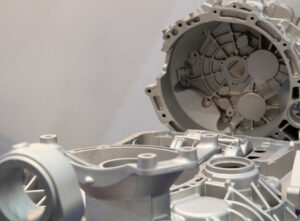Intro
Picking the right material for your die-casting project can make or break the final product. The wrong metal will be too expensive, take too long to cast, and can break once you use it. In an effort to help you pick the perfect material option, our die-casting experts put together this guide.
We’ll teach you all about zinc die casting and aluminum die casting. The goal is to show you which option is better, based on what your project demands.
Quick Intro to Die Casting

Die casting is a process where you fill a cavity in a mold with molten metal. Once the cavity is filled, the molten metal cools down and hardens into a solid piece of metal. That piece will get pushed out of the cavity, freeing up the mold to accept more molten metal and create anothe
r part.
Professional die-casting operations will handle everything from making the mold (called “tooling”) to running the molten metal and creating the final parts for you.
Within the world of die casting, there are multiple material choices that you can pick between. The metal you choose will be what your final parts are made out of. Of the many choices, zinc, and aluminum are the two most popular options.
Difference Between Zinc and Aluminum Die Casting
To pick the best option between zinc and aluminum, you need to understand the differences between these two metals within a die-casting operation. Here are some of the more relevant differences between zinc and aluminum die casting.
Total Weight
For many people, the weight of the final part is a critical design constraint. When it comes to this comparison, both metals are definitely higher than you might expect, but zinc is a little heavier than aluminum.
If you need to design a lightweight part, you might consider other metal types. If you just want to choose the lighter of these two options, then zinc is the way to go.
Melting Point
A lower melting point is great for die casting because it means that you can spend less energy and time creating each part. Zinc’s melting point is so much lower than aluminum, that it can even be used for hot chamber die casting (something that aluminum can’t do).
For reference, aluminum needs to be about 1.5 times hotter than zinc before it starts to melt.
Corrosion Resistance
Corrosion resistance is another non-negotiable constraint for many designs. If your part is going to be used outside, in salty conditions, or anywhere near acidic processes, then you’ll need a more corrosion-resistant metal.
Between these two, zinc is actually a lot better at corrosion resistance than aluminum. A lot of people assume that aluminum is rust-proof, but that’s not the case. If you were to put both of these metals in the same environment, you’ll notice that aluminum rusts mu
ch sooner.
Tooling Life
Another consideration to mention is the fact that aluminum is very abrasive in its fluid state. As molten aluminum keeps filling a cavity over and over, your mold will wear out much sooner. This results in a shorter tooling life as compared to zinc, a material that’s not nearly as abrasive.
In our experience, you can make about 100,000 aluminum parts from a single mold, while the same mold can make up to 1,000,000 zinc parts. That’s a lot of money saved, since tooling costs are always the driving cost in any die-casting operation.
Surface Finishing
What about the surface finish of the final part? For many people, having a shiny piece of metal dramatically helps sell the die-cast part. Well, you’ll have to go through a finishing step to polish or smooth out a part whether it’s made of aluminum or zinc. However, the zinc parts will get much smoother than aluminum ever could.
Why is that the case? Well, aluminum die-cast parts tend to have pores after casting. These pockets prevent a perfectly smooth finish.
Costs
The final cost of your parts will vary on a lot of factors. You’ll need to consider tooling costs, operating costs, and the price of the raw metal you’re using. As we covered earlier, zinc tooling lasts 10 times longer, and as a material, it’s about 3 to 4 times less expensive than aluminum.
This means that, in general, it’s more affordable to make zinc die-cast parts than it is to make the same part out of aluminum.
Strength
So far, we’ve been talking a lot about how great zinc is compared to aluminum. When it comes to strength, it’s a completely different story. Aluminum is about three times stronger than zinc in most loading conditions.
The strength of your part matters for a few reasons. Firstly, a stronger part will be able to be cyclically loaded more times before bending or failing. More importantly, a stronger part can handle more weight and manage a heavier load without breaking.
Time of Production (Cycle Time)
While die casting is a much faster process than CNC machining, you might still want to save time throughout this process. Each cycle of a die-casting operation entails loading a mold, letting it fill, cooling it, ejecting the solid part, and repeating the process.
With zinc’s lower melting temperature and lack of abrasives, you’ll find that zinc parts complete the full production cycle much faster than aluminum. Our experts estimate that zinc parts are about 200% faster to produce than aluminum.
Is Zinc Die Casting or Aluminum Die Casting Better?
Now it’s time for the million-dollar question: which is better, zinc die casting or aluminum die casting?
If you need a strong piece, then aluminum is clearly the way to go since it’s the much stronger option.
If you need parts produced quickly and more affordably, then zinc is the better option. As an added bonus, it’s also lighter and more corrosion-resistant than aluminum.
Conclusion
Our die-casting experts just covered everything you need to know about zinc and aluminum die casting. We reviewed both of these material options, and helped you pick the right one for your upcoming project. If you need help getting started on tooling or you need a company to run your die-casting operation, trust Rapid Axis. Our full-service machine shop can handle everything. Allow us to be your manufacturing partner, and get a free quote today.
